|
|
Ôñßôç, 15 Éïõëßïõ 2025
|
|
|
|
|
 |
|
|
 |
|
|
 |
|
|
 |
|
|
 |
|
|
 |
|
|
 |
|
|
 |
|
|
 |
|
|
 |
|
|
 |
|
|
 |
|
|
 |
|
|
 |
|
|
 |
|
|
 |
|
|
 |
|
|
|
|
 |
Éïýëéïò 2025 |
 |
| S |
M |
Ô |
W |
T |
F |
S |
 |
| 30 |
31 |
1 |
2 |
3 |
4 |
5 |
| 6 |
7 |
8 |
9 |
10 |
11 |
12 |
| 13 |
14 |
15 |
16 |
17 |
18 |
19 |
| 20 |
21 |
22 |
23 |
24 |
25 |
26 |
| 27 |
28 |
29 |
30 |
31 |
1 |
2 |
|
|
|
|
|
|
|
|
|
|
|
|
|
|
|
|
|
|

 Corinth - 2
Corinth - 2
|
|
|
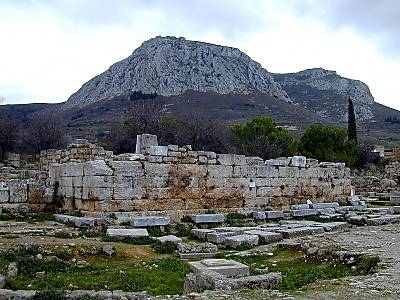
In Corinth Paul reasoned in the synagogue every sabbath, and persuaded the Jews and the Greeks. And when Silas and Timotheus were come from Macedonia, he «was pressed in the spirit, and testified to the Jews that Jesus was Christ» (Acts 18:5).
And when they opposed themselves and blasphemed, he shook his raiment, and said unto them: «Your blood be upon your own heads; I am clean: from henceforth I will go unto the Gentiles.»(vs. 18:6). And he went into the house of a certain man, named Justus, one that worshipped God, whose house 'joined hard' to the synagogue. Justus was a proselyte of the category called «that worshipped God». We are told that «Crispus, the chief ruler of the synagogue, believed on the Lord with all his house; and many of the Corinthians hearing believed, and were baptized.» (vs. 8). And when Gallio, the brother of the famous stoic philosopher and Nero's teacher, Seneca, was the deputy of Achaia, «the Jews made insurrection with one accord against Paul, and brought him to the judgment seat, saying, This fellow persuadeth men to worship God contrary to the law» (vv. 12,13). But before even Paul had the chance to open his mouth to refute the accusations of the Jews, Gallio dismissed them all, saying what they accused Paul of was not an offence against the law of Rome whose deputy he was. So Paul was delivered from the Jews and staying in Corinth a year and a half, as already said in another note, won many souls to Christ and established, perhaps, one of the largest churches in the Greco-Roman world. The photo shows the judgment seat of Gallio, the better-known as BEMA, as the archaeological spade has restored it, being today the most significant spot in the whole site from the Biblical point of view.
|
|
|
|
|
|

 Lydia
Lydia
|
|
|
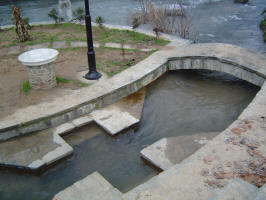
Philippi was an important city, in many respects, when the Apostle Paul visited it. He had been waiting for divine direction at Troas of Asia Minor with his companions in the ministry of the gospel, when the Macedonian call came. Philippi was about fifteen kilometers inland from Neapolis, the port town, where the Apostle disembarked. From Luke's narration one should think they spent no time at Neapolis, today's important and thriving Greek city in Macedonia called Kavala. God had prepared a harvest for His servants at Philippi and in that direction they moved without delay. Philippi's previous name was Crenides (Krenides, place of small fountains). As for the name Philippi the most prevalent aspect is that it was given it by Philip of Macedon, the father of Alexander the Great. Luke tells us, at the time, it was a colony, which meant that a lot of Romans lived there. The first thing Paul did upon setting foot at Philippi, as he did in every town or place he went, was to ask if there was a synagogue there and how could they find it. It seems the number of Jews and Proselytes was not enough to have and maintain a synagogue, but he was told somewhere by the little river Aggistas, every sabbath day, some women met for prayer. That was it! Right away the group made for the place, where, indeed, found some women met for that purpose. Among them was the now well-known Lydia. She was from Thyatira, a city in Asia Minor known from the book of Revelation. What had brought Lydia and her family to Philippi we are not told. Some other information about her that Luke gives is that she was a seller of purple, most probably, of a deep red dyeing substance coming from a species of mollusks. Paul spoke of Christ to those women and what we read about Lydia is marvelous. In the first place, she was a Proselyte, of those called "Worshippers of God", otherwise she wouldn't have been there. Then Luke goes on to say, she heard us:"Whose heart the Lord opened, that she attended unto the things spoken of Paul." (Acts 16:14). So Lydia and her household believed and were baptized, thus becoming the firstfruits of one of the most spiritual and soul-winning churches. There followed important and significant events, as the deliverance of that damsel possessed with a spirit of divination and the subsequent imprisonment of Paul and Silas. The miraculous earthquake resulting in the salvation of the jailer and his household and the founding of the blessed church known to us from Paul's relevant Epistle to the Philippians.The picture on the left shows the modified place where, according to tradition, Lydia's baptism was performed.
|
|
|
|
|
|

 Philippi-1
Philippi-1
|
|
|
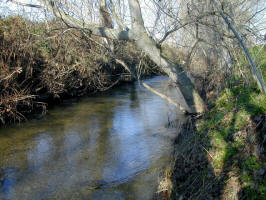
This is the river where Lydia and her household were baptized. Who and how many are meant by household we are not told. One thing is certain though, that all, and those that ever since picked up that place to be baptized, should have professed Christ as their Savior and be wholly immersed, in compliance with the Great Commission, "In the name of the Father, and of the Son, and of the Holy Ghost" by an agent acting under the authority of a local New Testament Church. The place where one is baptized plays no part at all, as long as all these basic conditions are met.
|
|
|
|
|
|

 Philippi-2
Philippi-2
|
|
|
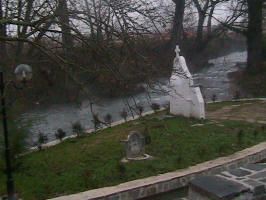
This picture shows the spot reputed to have been where Lydia was baptized. Man has put his hand to it and made the shown structures. The pictures are indeed not only pretty, but sentimentally fraught as well. What Christian wouldn't be deeply touched in his heart if seeing a place like this would think of the wonderful firstfruits of the beloved Philippian church? Thousands visit the place every year, but one wonders how many of them allow God to revive in them the wonderful thing He wrought here! It is our earnest prayer many of those tourists and visitors will think seriously about their souls and come to know Christ as their Savior, as did Lydia and her household.
|
|
|
|
|
|

 Patmos-partial view
Patmos-partial view
|
|
|
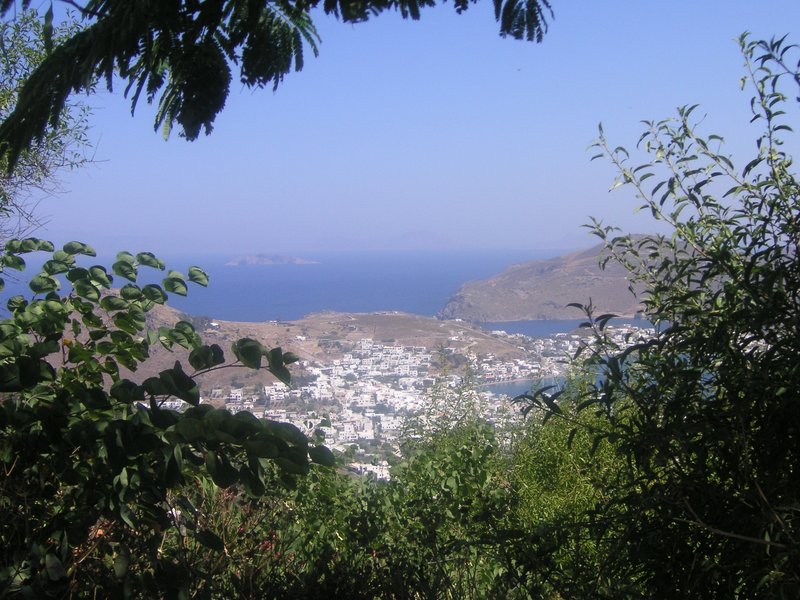
Patmos is one of the many beautiful Greek islands which administratively belongs to Dodecanese. Here, in the year A.D. 95, the Roman emperor Domitian exiled John the Apostle "For the word of God, and for the testimony of Jesus Christ" (Rev.1:9), which means, because he preached the word of God and testified of Christ! The sea separated him from the Asian Coast across where was the city of Ephesus with his beloved church, first of the seven to which, through him, the glorified Lord addressed His seven letters. However, it was here, in John's hard solitude, that the Lord visited him and gave him the wonderful visions that constitute the contents of the Apocalypse, for which, we Christians, from that day up to this, are deeply grateful to God.
|
|
|
|
|
|
|
|
|
|
|
|
|
|
|
|

